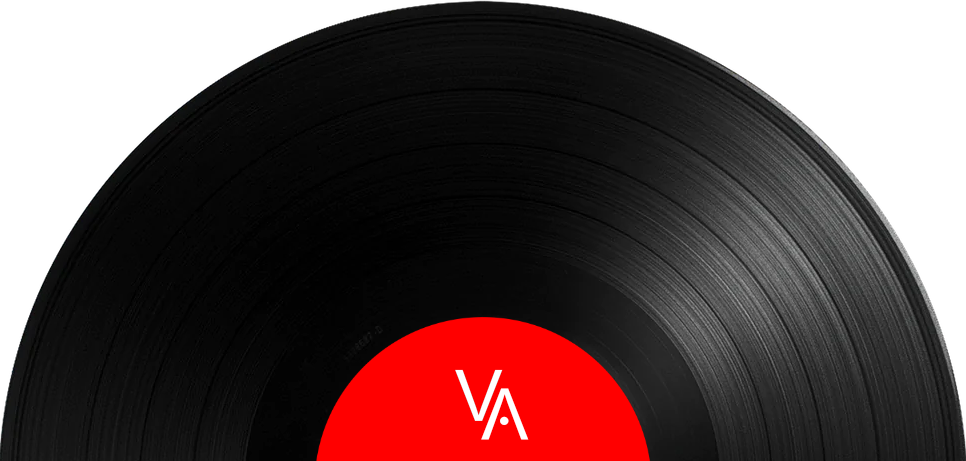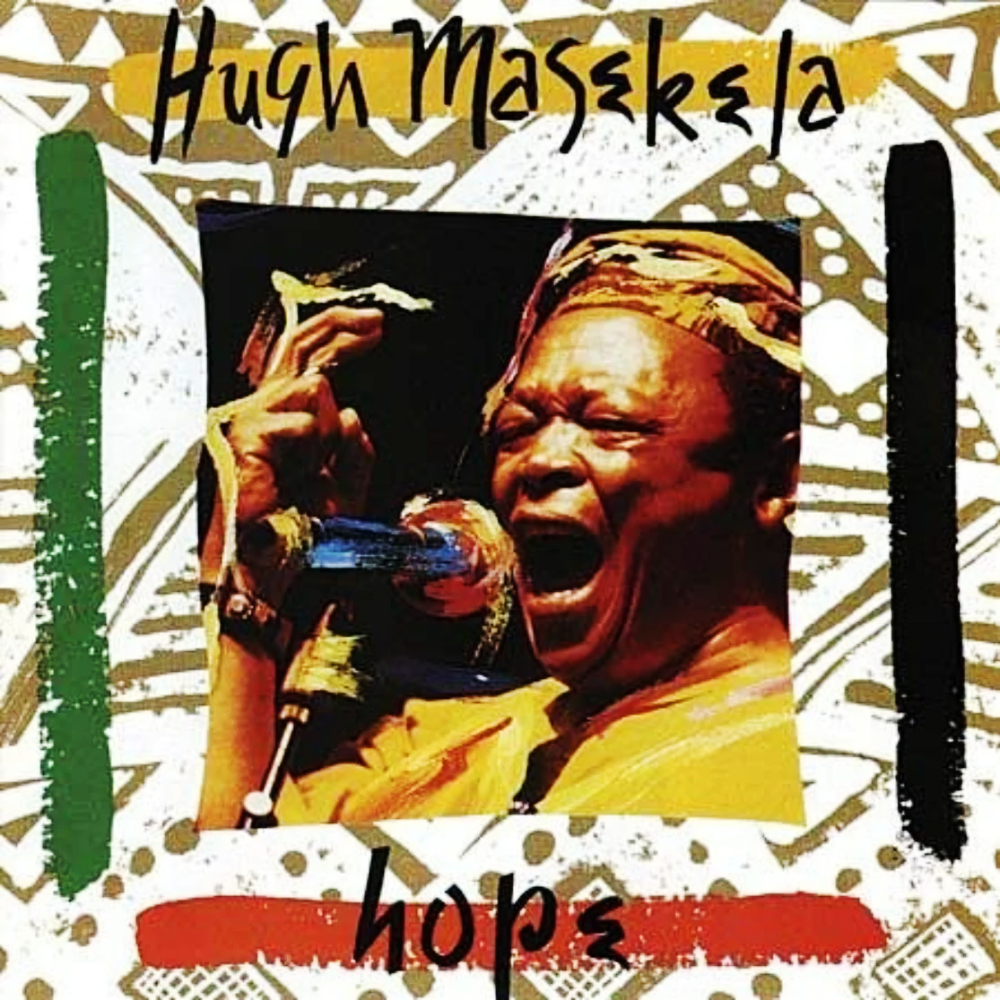
There are people out there who for whatever reason don't get this record, such as Michael Fremer over at Analogue Planet, who suggests the only reason people are buying this Analogue Productions LP by Hugh Masekela is because they think that if Analogue Productions put it out it must be something special. Fremer says that while it does indeed sound great it falls short musically, and the "audiofools" who buy it like it because they are supposed to like it - a kind of audiophile twist on the emperor isn't wearing any clothes thing.
According to Fremer Hope is an OK record - but just OK. And that's fine. Music is subjective after all, and while I really do enjoy reading Fremer's reviews and usually find them entertaining I tend to think he's wrong here. Hope is a well recorded 1993 live gig at Washington D.C.'s Blues Alley. Masekela was known for his political and anti-apartheid songs, such as Mandela (Bring Him Home), but by 1993 the song had ceased to be a call to arms. Nelson Mandela had already gone home a few years previously, and in 1994 would become the president of South Africa - something that couldn't have been imagined in 1987 when Masekela wrote the song and Mandella was confined to Poolsmoor Prison. But by the time of this Blues Alley concert it was just a song about a past wrong, not unlike a lot of the old blues songs about slavery.
I bought this record because I didn't previously own a copy and wanted one, and this pressing seemed to be the best sounding option. It does sound spectacular.
It's also the most expensive pressing. In Canada, with shipping, it was over $100!
I'll admit that a lot of people probably bought this record because they heard Stimela (Coal Train) playing in some high-end speaker shop. It's Masekela's most famous song and it's a good 'un. It could sell records and speakers. I first heard the studio version included on the Blue Thumb anthology All Day Thumbsucker Revisited and it was mesmerizing. It's the tune that turned me on to Masekela' s music and caused me to start collecting his records. Stimela is - of course - on this recording, too, as it's just one of those songs that pretty much had to be in any Masekela live set.
Hope opens with the magnificent Abangoma (The Healers) and right away the sense of space and separation presented itself. The instruments are all over the room. Masekela's horn floats way up high above everything else, which is all held together by the subtle percussive accents courtesy of Remi Kabaka, who has played with the Rolling Stones, Ginger Baker and Paul Simon, among others.
There's certainly an abundance of "afro-poppy" music on this record, one or two that bring to mind Kenny G for some reason. But that doesn't mean the record isn't a good listen. It is. There just isn't anything new or really deep here. But there's are some gems tucked amongst the poppish filler, such as the aforementioned Abangoma, Stimela and some others, including Nomali, an eight minute slow romp with piano that just feels good. Languta is another really good one, and so is Grazing In The Grass. The studio version of the latter would hit number one on the U.S. pop charts in 1968.
Do you need this record? Probably not. It's never going to be another Kind Of Blue (which you do need) or Dark Side Of The Moon (which you also need) - two albums Fremer is sure the audiofools who bought this record must also have in their collections. Because, you know, they are are supposed to have them. Masekela no doubt gave better performances throughout his career, but this one was recorded - and recorded well - so here it is and it sounds great. It is what it is. But it's also a chance to hear someone who mattered play some of the music that helped bring about change where and when it was sorely needed.
For that reason alone - and for everything else it isn't - Hope is a really decent record.
There are people out there who for whatever reason don't get this record, such as Michael Fremer over at Analogue Planet, who suggests the only reason people are buying this Analogue Productions LP by Hugh Masekela is because they think that if Analogue Productions put it out it must be something special. Fremer says that while it does indeed sound great it falls short musically, and the "audiofools" who buy it like it because they are supposed to like it - a kind of audiophile twist on the emperor isn't wearing any clothes thing.
According to Fremer Hope is an OK record - but just OK. And that's fine. Music is subjective after all, and while I really do enjoy reading Fremer's reviews and usually find them entertaining I tend to think he's wrong here. Hope is a well recorded 1993 live gig at Washington D.C.'s Blues Alley. Masekela was known for his political and anti-apartheid songs, such as Mandela (Bring Him Home), but by 1993 the song had ceased to be a call to arms. Nelson Mandela had already gone home a few years previously, and in 1994 would become the president of South Africa - something that couldn't have been imagined in 1987 when Masekela wrote the song and Mandella was confined to Poolsmoor Prison. But by the time of this Blues Alley concert it was just a song about a past wrong, not unlike a lot of the old blues songs about slavery.
I bought this record because I didn't previously own a copy and wanted one, and this pressing seemed to be the best sounding option. It does sound spectacular.
It's also the most expensive pressing. In Canada, with shipping, it was over $100!
I'll admit that a lot of people probably bought this record because they heard Stimela (Coal Train) playing in some high-end speaker shop. It's Masekela's most famous song and it's a good 'un. It could sell records and speakers. I first heard the studio version included on the Blue Thumb anthology All Day Thumbsucker Revisited and it was mesmerizing. It's the tune that turned me on to Masekela' s music and caused me to start collecting his records. Stimela is - of course - on this recording, too, as it's just one of those songs that pretty much had to be in any Masekela live set.
Hope opens with the magnificent Abangoma (The Healers) and right away the sense of space and separation presented itself. The instruments are all over the room. Masekela's horn floats way up high above everything else, which is all held together by the subtle percussive accents courtesy of Remi Kabaka, who has played with the Rolling Stones, Ginger Baker and Paul Simon, among others.
There's certainly an abundance of "afro-poppy" music on this record, one or two that bring to mind Kenny G for some reason. But that doesn't mean the record isn't a good listen. It is. There just isn't anything new or really deep here. But there's are some gems tucked amongst the poppish filler, such as the aforementioned Abangoma, Stimela and some others, including Nomali, an eight minute slow romp with piano that just feels good. Languta is another really good one, and so is Grazing In The Grass. The studio version of the latter would hit number one on the U.S. pop charts in 1968.
Do you need this record? Probably not. It's never going to be another Kind Of Blue (which you do need) or Dark Side Of The Moon (which you also need) - two albums Fremer is sure the audiofools who bought this record must also have in their collections. Because, you know, they are are supposed to have them. Masekela no doubt gave better performances throughout his career, but this one was recorded - and recorded well - so here it is and it sounds great. It is what it is. But it's also a chance to hear someone who mattered play some of the music that helped bring about change where and when it was sorely needed.
For that reason alone - and for everything else it isn't - Hope is a really decent record.


